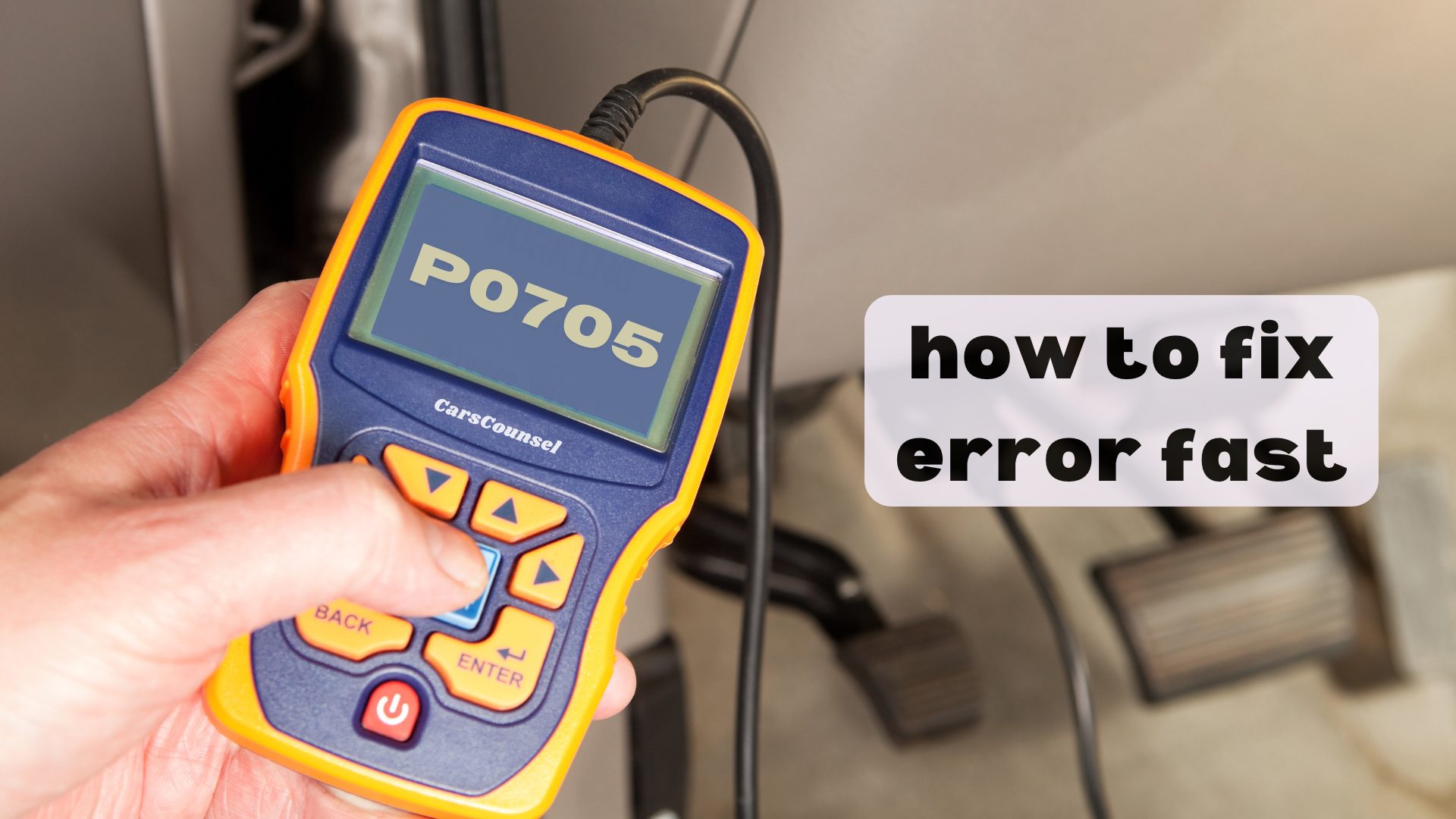When you see the P0705 code, it means there’s a problem with your transmission range sensor. This sensor helps your car select the right gear, so if it’s not working properly, your car might have trouble shifting gears.
To fix this issue quickly, start by using a diagnostic scanner to confirm the error and see if there are any other OBD2 Codes related problems.
So, what should you do next to make sure your car runs smoothly and this error doesn’t come back? Let’s go through the key steps you need to take.

Quick Navigation
Key Takeaways
- Use a diagnostic scanner to confirm the P0705 code and pinpoint the bad transmission range sensor.
- Check and clean the wiring and connections for any rust or damage.
- Replace the bad transmission range sensor by following the instructions in the vehicle’s service manual.
- Update the car’s computer software and see if there are any new updates from the manufacturer.
Understanding P0705 Code
The P0705 code means there’s a problem with the transmission range sensor, which tells the engine control unit (ECU) what gear the car is in. If this sensor isn’t working right, it can mess up how your car shifts gears and make it less fuel-efficient.
To prevent these problems, regularly check the sensor and its wiring for any damage or rust. Doing simple things like looking at and cleaning the sensor can keep it working well.
Fixing any issues as soon as you find them will help avoid bigger transmission problems. By taking care of the sensor, you’ll ensure your car shifts gears smoothly and runs efficiently.
Tools for Diagnosing P0705
When diagnosing a P0705 code, you’ll need a reliable scanner to quickly identify the issue and check for other related codes. Accurate diagnostics start with the right tools and techniques to pinpoint the problem.
- Diagnostic Scanner: Make sure it can read transmission-related codes and show real-time data.
- Multimeter: Great for checking the continuity and resistance of the transmission range sensor and its wiring.
Common Causes of P0705
After you find the P0705 code with your diagnostic tools, look into common causes like a bad transmission range sensor due to wear and tear or damage from the environment.
Keeping the sensor in good shape is crucial to avoid these problems. Regularly check the wiring for any signs of rust or loose connections, as these can cause the P0705 code to pop up.
Damaged wiring or poor connections are often the main issues, so make sure to inspect the wiring thoroughly. Also, external factors like heat, moisture, and dust can mess up the sensor’s performance, leading to problems.
Impact of Faulty Sensors
A bad transmission range sensor can mess up gear shifting, causing your car to drive unpredictably and potentially harm the transmission. When the sensor doesn’t work right, it can’t accurately tell the car’s computer what gear it’s in.
Here’s what can happen:
- Unpredictable Shifting: Bad sensor data can make the transmission shift gears randomly.
- Transmission Damage: Constant bad signals can wear out the parts in the transmission.
Fixing sensor problems quickly is important. Checking how a bad sensor affects the car helps you understand the immediate problems and shows why it’s crucial to fix it soon to avoid bigger issues later.
Wiring and Connection Issues
Fixing wiring and connection problems is just as important because damaged or corroded connections can mess up the transmission range sensor‘s ability to tell the ECU what gear you’re in.
Start by carefully looking at the wiring harness connected to the sensor. Check for any signs of wear, rust, or damage. If you spot any problems, you’ll need to fix the wiring to get things working right again.
Don’t forget to keep the connections clean and securely attached. Applying dielectric grease can help prevent future rust.
Even small issues with the wiring or connections can seriously affect the sensor’s performance, so these checks are crucial for fixing the P0705 code properly.
ECU and Software Problems
When dealing with ECU and software problems related to a P0705 code, make sure the ECU’s firmware is current. Outdated software can cause miscommunication between the transmission range sensor and the ECU.
Check if the ECU needs updates and install any if necessary. Keeping the software up to date is crucial for accurate data exchange between parts.
- Look for software updates: Manufacturers often release updates to fix issues and boost performance.
- Reprogram the ECU if needed: Sometimes, the ECU might need reprogramming to fix ongoing problems.
Fixing software issues ensures the ECU and transmission range sensor communicate properly, preventing future problems.
Vehicles Prone to P0705
Some cars are more likely to have problems with the P0705 code, which is often due to issues with their transmission range sensor or wiring. This problem can come from regular wear and tear, environmental factors, or bad connections in the automatic transmission system.
Here are some of the cars that often face this issue:
| Vehicle Model | Common Issue | Affected Years |
|---|---|---|
| Honda Accord | Transmission sensor issue | 1998-2002 |
| Dodge Grand Caravan | Sensor or wiring problems | Various |
| Ford Focus | Transmission sensor failures | Various |
Regular check-ups and maintenance can help prevent these problems and keep your car’s automatic transmission working well.
Risks of Driving With P0705
Driving with a P0705 code can cause serious transmission problems, affecting how well your car runs and your safety. If you ignore this code, your transmission might start acting up, leading to erratic shifting or making your car go into limp mode. This can make driving unsafe, as you could suddenly lose power or have trouble changing gears.
Erratic Shifting: Your car might change gears unpredictably, making it hard to control.
Limp Mode: Your car might limit its speed and power, making it tough to drive safely.
Higher Repair Costs: If you don’t fix the issue, it could cause more damage to your transmission, leading to expensive repairs.
Fixing the P0705 code right away ensures your car runs safely and reliably.
Replacing Transmission Range Sensor
Fixing the transmission issues and preventing more problems involves replacing the bad transmission range sensor (TRS). First, make sure you have the right TRS for your vehicle. Start by disconnecting the negative battery terminal to avoid any electrical shocks. Find the TRS on the transmission and carefully take out the old sensor. Put in the new sensor, ensuring it’s properly connected and aligned.
Here’s a simple breakdown to keep you on track:
| Step | Action | Feeling |
|---|---|---|
| 1. Preparation | Gather tools and TRS | Ready and Determined |
| 2. Disconnect | Negative battery terminal | Safe and Secure |
| 3. Remove | Old sensor | Focused and Precise |
| 4. Install | New TRS | Accomplished and Relieved |
Follow these tips to make sure the sensor installation goes smoothly.
Preventing P0705 Code
To avoid a P0705 code, regularly check your transmission range sensor and make sure the wiring is clean and secure.
Here’s what you should do:
- Check the Sensor Often: Look at the transmission range sensor for any signs of wear or damage. If it looks worn out, replace it to prevent problems.
- Inspect Wiring and Connectors: Ensure all wiring and connectors are clean, free from rust, and tightly connected. Loose or corroded connections can cause errors.
More OBD-II Codes
Frequently Asked Questions
How Much Does It Cost to Replace a Transmission Range Sensor?
Replacing a transmission range sensor will cost you between $150 and $300. This price includes both parts and labor. The exact amount can vary depending on your car’s make and model and the labor rates at the repair shop you choose.
Can a P0705 Code Trigger the Check Engine Light?
Imagine driving and suddenly, the check engine light comes on. Yes, a P0705 code can cause this warning. It means there’s a problem with your transmission range sensor, so you should get it checked out before it leads to bigger transmission issues.
What Symptoms Indicate a Failing Transmission Range Sensor?
Look out for jerky shifting, the wrong gear showing on the display, or not being able to shift out of park. These signs point to problems with your transmission and sensor issues, which could mean your transmission range sensor is failing. Get it checked right away to prevent more damage.
Are There DIY Solutions for Addressing a P0705 Code?
You can try fixing a P0705 code yourself by starting with the sensor. Look at the transmission range sensor and its wiring to see if there’s any damage. Use a diagnostic scanner to make sure there are issues before you replace any parts on your own.
How Long Does It Take to Fix a P0705 Code Issue?
Figuring out what’s causing a P0705 code usually takes about an hour. Fixing it can take anywhere from 1 to 3 hours, depending on the problem. This could involve changing a sensor, fixing some wiring, or updating the car’s computer.
Conclusion
To sum it up, fixing the P0705 code can be quick if you follow the right steps.
Use your diagnostic scanner to find the problem, check and clean connections carefully, and replace any faulty parts.
Reset the ECU and test drive your car to make sure the issue is resolved.
By acting fast, you’ll keep your car running smoothly and avoid bigger problems down the road.

